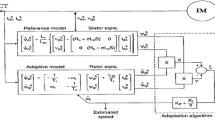Abstract
This paper addresses the problem of wide speed range sensorless control of induction motor. The proposed method is based on model reference adaptive system (MRAS), in which the current model serves as the adjustable model, and a novel hybrid model integrating the modified voltage model (MVM) and high-frequency signal injection method (HFSIM) are established to serve as the reference model. The HFSIM works together with MVM to improve the performance of the rotor speed and rotor flux position estimation at low speed, whereas at high speed, the MVM acts alone. In addition, a rotor resistance online estimation scheme is proposed to update the rotor resistance contained in the adjustable model and to ensure the estimation accuracy further. Experimental results show that the proposed MRAS method is very effective from low to high speed range, including zero speed.
Similar content being viewed by others
References
J. Hu, B. Wu. New integration algorithms for estimating motor flux over a wide speed range[J]. IEEE Transactions on Power Electronics, 1998, 13(5): 969–977.
S. Tamai, H. Sugimoto, M. Yano. Speed-sensorless vector control of induction motor with model reference adaptive system[C]//Conference Record of the 1985 IEEE-IAS Annual Meeting. Piscataway: IEEE, 1985: 613–620.
C. Shauder. Adaptive speed identification for vector control of induction motor without rotational transducers[J]. IEEE Transactions on Industrial Applications, 1992, 28(5): 1054–1061.
K. Tungpimolrut, F. Peng, T. Fukao. Robust vector control of induction motor without using stator and rotor circuit time constant[J]. IEEE Transactions on Industrial Applications, 1994, 30(5): 1241–1246.
S. Maiti, C. Chakraboty, Y. Hori, et al. Model reference adaptive controller-based rotor resistance and speed estimation techniques for vector controlled induction motor drive utilizing reactive power[J]. IEEE Transactions on Industrial Electronics, 2008, 55(2): 594–601.
M. Cirrincione, M. Pucci, G. Cirrincione, et al. A new TLS-based MRAS speed estimation with adaptive integration for high-performance induction machine drives[J]. IEEE Transactions on Industrial Applications, 2004, 40(4): 1116–1137.
J. Ha, S. Sul. Sensorless field-orientation control of an induction machine by high-frequency signal injection[J]. IEEE Transactions on Industrial Applications, 1999, 35(1): 45–51.
K. Ide, J. Ha, M. Sawamura, et al. High frequency injection method improved by flux observer for sensorless control of an induction motor[C]//Proceedings of the Power Conversion Conference. New York: IEEE, 2002: 516–521.
K. Akastu, A. Kawamura. Sensorless very low-speed and zero-speed estimation with online rotor resistance estimation of induction motor without signal injection[J]. IEEE Transactions on Industrial Applications, 2000, 36(3): 764–771.
M. L. Campbell, J. Chiasson, M. Bodson, et al. Speed sensorless identification of the rotor time constant in induction machines[J]. IEEE Transactions on Automatic Control, 2007, 52(4): 758–763.
S. K. Jeong, Z. G. Lee, H. A. Toliyat, et al. Sensorless control of induction motor with simultaneous on-line estimation of rotor resistance and speed based on the feedforward torque control scheme[C]//IEEE International Conference on Electric Machines and Drives. New York: IEEE, 2003: 1837–1842.
J. Holtz. Sensorless control of induction machines-with or without signal injection?[J]. IEEE Transactions on Industrial Electronics, 2006, 53(1): 7–30.
Author information
Authors and Affiliations
Corresponding author
Additional information
This work was supported by the National Basic Research Program of China (973 Program) (No. 2007CB714006).
Zhanguo XU was born in Jilin Province, China, in 1974. He received his B.E. and M.S. degrees in Control Theory and Control Engineering, at the Department of Automation, Xi’an Polytechnic University. He is currently pursuing his Ph.D. degree at the School of Electronics and Information Engineering, Dalian University of Technology. His research interests include power electronic and intelligent motion control.
Cheng SHAO was born in Liaoning Province, China, in 1958. He received his B.E. degree in Applied Mathematics, and both his M.S. and Ph.D. degrees in Control Theory and Control Engineering. He is currently a professor at the School of Electronics and Information Engineering, Dalian University of Technology. His research interests include robust adaptive control, intelligent learning control, and optimizing control for chemical processes.
Dongju FENG was born in Shandong Province, China, in 1972. She received her Ph.D. degree in Mechanical Manufacture and Automation at the Dalian University of Technology. She is currently a lecturer at the School of Mechanical and Engineering, Dalian University of Technology.
Rights and permissions
About this article
Cite this article
Xu, Z., Shao, C. & Feng, D. An MRAS method for sensorless control of induction motor over a wide speed range. J. Control Theory Appl. 9, 203–209 (2011). https://doi.org/10.1007/s11768-011-8202-y
Received:
Revised:
Published:
Issue Date:
DOI: https://doi.org/10.1007/s11768-011-8202-y




